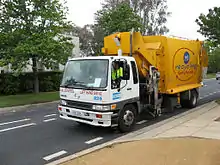Recycling in Australia
Recycling in Australia is a widespread but not comprehensive part of waste management in Australia. Various paper recycling and appliance recycling services are available.


Household recycling is encouraged through the use of recycling bins. A sampling of the contents of the recycling bin in Victoria shows around 10% of the material should not have been disposed of by bin.[2] These bins are comingled, meaning that often paper, glass and hard plastic all go into the same bin.[3]
Electronic waste collection services were mandated under The National Television and Computer Recycling Scheme. The scheme was established in 2011.[4] Australia does not have a national scheme for battery recycling.[5] Container deposit legislation has been established in several states while others are rolling out schemes. Despite some recycling and re-use of lightweight plastic bags they are being phased out.
Clean Up Australia is a national organisation dedicated to addressing environmental issues such as recycling.
In 2014-2015, 58% of all waste produced in Australia was recycled or recovered.[6] In 2016-2017, 46% of Municipal Solid Waste (MSW) was recycled.[7]
A parliamentary inquiry into the waste and recycling industry in Australia filed a report on 13 June 2018.[8]
On 1 January 2018, China restricted imports on 24 categories of Australian recycling materials, resulting in stockpiling of recyclable materials in Australia. Waste Management Association of Australia president Garth Lamb has advocated for infrastructure projects to use recovered recycled materials rather than raw materials, such as crushed glass replacing sand in roadworks.[9] The restrictions impose a maximum contamination threshold for accepted materials of 0.5% which is unlikely to be met by the industry in Australia.[10]
Vehicle recycling
Automotive recycling is considered as one of the main solution to the environmental concern about growing number of vehicles reaching End_Of_Life (EOL) cycle. According to Australian Bureau of Statistics data, during 2001 to 2015 the number of new motor vehicles sales increased by 48% in Australia.[11] Similarly with average life cycle of vehicle in Australia of 10.1 years, the number of vehicle reaching its EOL cycle is growing fast too. Only during 2014 to 2015 in Australia 765,828 number of vehicles reached their End-Of-Life cycle.[12] To face this environmental concern automotive recycling has very important role to play. In regard to vehicle recycling What makes this issue an opportunity for business is the high rate recovery 85-95% of the material used in vehicles[13]
In Australia, vehicle reached their EOL are passed from owners to the auto recyclers or so called auto wreckers directly or through insurance company, car repair mechanics and used car dealers.[14] In first stage the car batteries and fluids will be removed under depollution process. In second stage the valuable and high demand vehicle parts are recovered EOL vehicles and sale in the market for reuse and to get financial gain. In last stage of the recycling the remaining part of EOL vehicle are passed to metal recycling facilities to recover the valuable metals.
In different parts of the world, auto recycling or EOL vehicles waste is restricted with number of national legislations. In Europe it is European union body, similarly Japanese and Koreans have their own specific measurements and regulatory legislations. In contrast some developed countries like US, Australia and Canada have no specific regulations in the form of mandatory legislations to follow for EOL vehicles management.[15] In Australia the EOL vehicle managements are driven mostly by economic mechanisms. under recent circumstances of no national legislation in regard to EOL vehicles managements, most recyclers are motivated due to the value of metal scarp and valuable parts they acquire from vehicles.[14][16]
See also
References
- "Australasian Recycling Label". Recycling Near You. Archived from the original on 31 May 2019. Retrieved 5 June 2019.
- "Victorian Statewide Garbage Bin Audits". Publications and Research. Sustainability Victoria. Retrieved 28 September 2017.
- Zhou, Naaman (3 July 2018). "Is this the end of the yellow all-in-one recycling bin?". the Guardian. Retrieved 6 July 2018.
- "National Television and Computer Recycling Scheme". Department of Environmental and Energy. Retrieved 28 September 2017.
- "Battery Recycling". Fact sheets. Clean Up Australia. Retrieved 28 September 2017.
- "National Waste Report 2016" (PDF). environment.gov.au.
- "National Waste Report 2018" (PDF). environment.gov.au.
- "Waste and recycling industry in Australia". www.aph.gov.au.
- "Chinese rubbish ban 'could see end of kerbside recycling' in Australia". ABC News. 8 February 2018. Retrieved 19 April 2018.
- Downes, Jenni. "China's recycling 'ban' throws Australia into a very messy waste crisis". The Conversation. Retrieved 1 May 2018.
- Parker, Talei (30 November 2017). "The DataLab of the Australian Bureau of Statistics". Australian Economic Review. 50 (4): 478–483. doi:10.1111/1467-8462.12246. ISSN 0004-9018.
- Australian Bureau of Statistics (23 July 2015). "Motor cycles outpace other vehicles". www.abs.gov.au. Retrieved 18 June 2019.
- Department of the Environment, Australia. 2009. National Waste Policy: Less Waste, More Resources (accessed September 17, 2020).
- McNamara N. Vehicle Recycling and Sustainability. Melbourne, Australia: International Specialised Skills Institute Inc; 2009
- Sakai, Shin-ichi; Yoshida, Hideto; Hiratsuka, Jiro; et al. (February 2014). "An international comparative study of end-of-life vehicle (ELV) recycling systems". Journal of Material Cycles and Waste Management. 16 (1): 1–20. doi:10.1007/s10163-013-0173-2. ISSN 1438-4957.
- Soo, Vi Kie; Compston, Paul; Doolan, Matthew (2016). "Is the Australian Automotive Recycling Industry Heading towards a Global Circular Economy? – A Case Study on Vehicle Doors". Procedia CIRP. 48: 10–15. doi:10.1016/j.procir.2016.03.099.
External links
- https://recyclingnearyou.com.au/ - run by Planet Ark, lists places that items that aren't accepted in council recycling bins can be recycled.
- https://www.cartakebackaust.com/ - responsibly recycle cars across Australia and offer a free car collection service.
